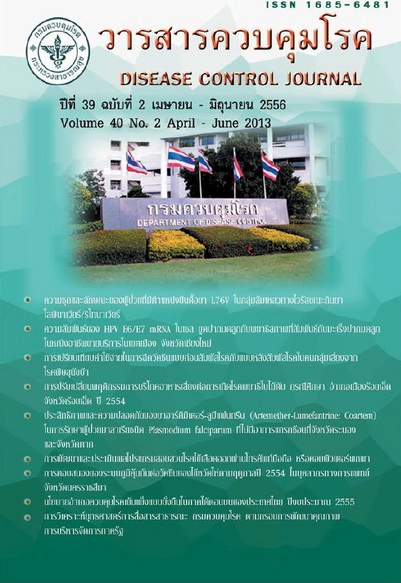Efficacy and Safety of Artemether-Lumefantrine (Coartem®) for the Treatment of Uncomplicated Plasmodium falciparum Malaria in Ranong and Tak provinces
DOI:
https://doi.org/10.14456/dcj.2013.34Keywords:
Plasmodium falciparum, Artemether-Lumefantrine, Ranong Province Tak ProvinceAbstract
The declining in efficacy of artesunate-mefloquine combination for the treatment of uncomplicated falciparum malaria along the western border of Thailand with Myanmar was less intense than the eastern border with Cambodia. However, the situation had higher impact because of the higher incidence of falciparum malaria patients in the western border. This study aimed at the evaluation of the efficacy and safety of an alternative treatment regimen; a standard 6 doses of a fixed dose combination of artemether-lumefantrine. Acute uncomplicated falciparum malaria patients attending 2 malaria clinics in Ranong province and 3 malaria clinics in Tak province who were fulfilled with the inclusion criteria according to the World Health Organization standard procedure for the efficacy study of antimalarial drug were enrolled into the study. Patients were treated with oral doses of a fixed dose combination of artemether and lumefantrine and were followed up for 42 days. During January to August 2012, 92 patients were enrolled. Of the 79 evaluable patients, 46 and 33 were from Ranong and Tak provinces, respectively. Among the patients completed 28-day follow-up, the adequate clinical and parasitological responses (ACPR) were 93.5% (95%CI = 82.5%-97.8%) in Ranong province and 93.9% (79.3%-98.2%) in Tak province. The ACPR of the 42-day follow-up were 90.9% (95% CI = 78.8%-96.4%) in Ranong province and 93.5% (95% CI = 79.3%-98.2%) in Tak province but there was no statistical different (p>0.05). In conclusion, a 6-doses artemether-lumefantrine in this study was effective and safe for the treatment of acute uncomplicated falciparum malaria. It is able to be an alternative treatment of the acute uncomplicated falciparum malaria in Thailand. However, adherence to the drug should be monitored when the drugs were given to out-patient.
Downloads
References
2. Wernsdorfer WH. Coartemether (artemether and lumefantrine): an oral antimalarial drug. Expert Rev Anti Infect Ther 2004; 2: 181-196.
3. Ezzet F, Mull R, Karbwang J. Population pharmacokinetics and therapeutic response of CGP 56697 (artemether + benflumetol) in malaria patients. Br J Clin Pharmacol 1998; 46: 553-561.
4. Ezzet F, van Vugt M, Nosten F, Looareesuwan S, White NJ. Pharmacokinetics and pharmacodynamics of lumefantrine (benflumetol) in acute falciparum malaria. Antimicrob Agents Chemother 2000; 44: 697-704.
5. White NJ, van Vugt M, Ezzet F. Clinical pharmacokinetics and pharmacodynamics of artemether-lumefantrine. Clin Pharmacokinet 1999; 37: 105-125.
6. Bakshi R, Hermeling-Fritz I, Gathmann I, Alteri E. An integrated assessment of the clinical safety of artemether-lumefantrine: a new oral fixeddose combination antimalarial drug. Trans R Soc Trop Med Hyg 2000; 94: 419-424.
7. Bindschedler M, Lefevre G, Degen P, Sioufi A. Comparison of the cardiac effects of the antimalarials co-artemether and halofantrine in healthy participants. Am J Trop Med Hyg 2002; 66: 293-298.
8. Omari A, Gamble C, Garner P. Artemetherlumefantrine (six-dose regimen) for treating uncomplicated falciparum malaria. Cochrane Database Syst Rev CD005564.
9. World Health Organization. Severe falciparum malaria. Transactions of the Royal Society of Tropical Medicine and Hygiene, 2000, 94(Suppl. 1):1-90.
10. WHO. Assessment and monitoring of antimalarial drug efficacy for the treatment of uncomplicated falciparum malaria. Geneva, World Health Organization, 2003 (WHO/RBM/HTM/2003.50) (http://www. who.int/malaria/resistance).
11. Valecha N, Phyo AP, Mayxay M, Newton PN, Krudsoos S, Keomany S, et al. An open-label, randomized study of dihydroartemisininpiperaquine versus artesunate-mefloquine for
Downloads
Published
How to Cite
Issue
Section
License
Articles published in the Disease Control Journal are considered as academic work, research or analysis of the personal opinion of the authors, not the opinion of the Thailand Department of Disease Control or editorial team. The authors must be responsible for their articles.






